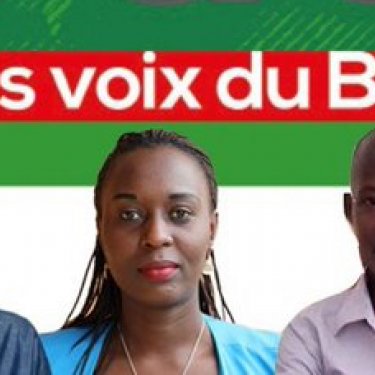Four Burundian journalists arrested while covering rebel incursion

Reporters Without Borders (RSF) condemns the arrest of four Burundian journalists and their driver while they were covering clashes between rebels and government forces in northwestern Burundi on 22 October, and calls for their immediate release.
The four reporters, Christine Kamikazi, Agnès Ndirubusa, Térence Mpozenzi and Egide Harerimana, who work for Iwacu, one of the few independent media outlets still operating in Burundi, and their driver, Adolphe Masabarakiza, were arrested in Musigati, a town in the northwestern province of Bubanza near the edge of the Kibira rainforest.
They went there to cover a surprise incursion by around 100 Burundian rebels based in the east of the neighbouring Democratic Republic of Congo who are opposed to President Pierre Nkurunziza’s regime in Burundi. In clashes between the rebels and government forces that began on the morning of 22 October, at least 14 rebels were killed, Burundian officials said, while the rebels claim to have killed around 10 members of the security forces.
RSF has learned from several sources that the journalists were arrested at around noon on 22 October while interviewing residents fleeing the fighting. After being taken to police headquarters in the city of Bubanza, the provincial capital, they were interrogated by the judicial police and then the regional intelligence chief, and two mobile phones were taken from them. They have not been formally charged.
“These journalists were just doing their job by going to verify reports of armed clashes,” said Arnaud Froger, the head of RSF’s Africa desk. “By arresting the journalists in an attempt to suppress coverage of an embarrassing development, the Burundian authorities are just drawing attention to their arbitrary detention and the events they went to cover. We urge the authorities to free the journalists without delay, to return their equipment and to not associate those making the news with those who just cover it.”
After clashing with the government forces, the rebel group reportedly entered the Kibira rainforest, which is one Burundi’s biggest nature reserves and is known to shelter Burundian rebel groups. It is extremely hard for Burundian journalists to cover such subjects because the Nkurunziza regime suppresses information that could threaten its interests.
In 2015, Nkurunziza’s announcement that he was running for a third term and his subsequent reelection plunged Burundi into one of the worst crises in its history. According to the International Criminal Court, at least 1,200 people were killed in the space of a few weeks in protests about the electoral process.
The crisis has taken a massive toll on Burundi’s media. Radio stations were burned down, dozens of journalists fled into exile and the media outlets that still try to keep independent reporting alive are constantly harassed or are banned outright.
The BBC closed its bureau in the capital, Bujumbura, in July after failing to get the Burundian authorities to lift the order suspending its activities that was issued after it broadcast a TV documentary accusing the Burundian security services of operating secret torture and detention sites with the aim of silencing dissent. An order suspending Voice of America for six months in 2018 was meanwhile extended indefinitely in March.
The website of Iwacu, which was recently accused of “bias and defamation” by the National Communication Council (CNC), is often blocked by the authorities, prompting RSF to intercede. The authorities have never shed light on the disappearance of an Iwacu journalist, Jean Bigirirmana, more than three years ago, after he was abducted by the intelligence services. RSF continues to demand DNA analyses of two bodies that were found a few weeks after he disappeared.
The clampdown on Burundi’s media is such that RSF recently said it feared for the survival of any remnant of independent journalism in the run-up to next May’s presidential election.
Burundi is ranked 159th out of 180 countries in RSF’s 2019 World Press Freedom Index.


